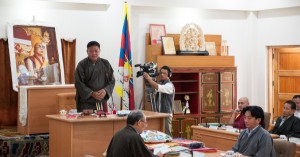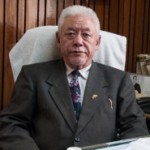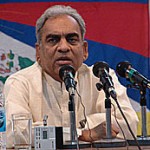The sixth session of the 15th Tibetan Parliament-in-Exile was held in Dharamshala, India on September 18 – 28.
The agenda for this 11 day session included the presentation of annual reports of the seven departments of the Central Tibetan Administration (CTA), the annual report and recommendations of the 5th Public Accounts Committee, and deliberations about the current situation in Tibet.
On the first day of the session Speaker Penpa Tsering, in his opening remarks, appealed to the Chinese government to resolve the Tibetan crisis, saying, “China’s policy of modernisation to fulfil the aspirations of Tibetans has only ruined the Tibetan identity, culture, religion and its environment.”
The Speaker expressed appreciation of the All India Lobbying Campaign undertaken by the Kashag (Tibetan cabinet) last year to garner support for the Tibetan cause from the various Indian state governments. He said that Parliament would continue to carry out such campaigns.
He also reminded parliamentarians of His Holiness the Dalai Lama’s address on Democracy Day during which he had expressed concern over the public servants’ indifferent attitude towards the general public and had urged officials to serve and address the grievances of the Tibetan public as a priority.
Parliament then passed three resolutions unanimously. The resolutions praised the courage and will of the Tibetan self-immolators, urged China to adopt the Middle-Way Approach and look into the grievances of the self-immolators, and lastly urged the international community to send a fact-finding delegation to Tibet, and the UN Human Rights Council to convene an urgent session over the critical situation in Tibet.
On the session held on September 21, Parliament appointed the Secretary for Religion and Culture, Mr Ngawang Choedak Choetri Tengpa, as the new Justice Commissioner of the Tibetan Supreme Justice Commission. Mr Ngawang Choedak polled 21 votes, against 16 for Mr Kargyu Dhondup, the auditor general of the CTA. Mr Ngawang Choedak earlier served as secretary of the Tibetan Supreme Justice Commission.
The Speaker and Sikyong had an audience with His Holiness the Dalai Lama on September 22, and relayed to Parliament that His Holiness had said that there will a resolution for Tibetan cause and he will live to see it.
Two resolutions were also passed in mourning for individuals who had been well associated with the Tibetan cause. Indian Rajya Sabha member, Mohan Singh, was the convener of the All India Parliamentary Forum on Tibet (AIPFT). The first World Parliamentarians Convention on Tibet (WPCT) was held in New Delhi in 1994 during his convenorship.
On September 26, a resolution was passed mourning the death of Mr Robert W Ford, the first foreigner employed by the Tibetan government, who set up the Radio and Telegraph Office in Lhasa in 1947. A Britisher, he had written a book entitled “Captured in Tibet”, and account of his arrest by Chinese officials on suspicion of being a spy, and had also founded the first ever Tibet Society in 1959.








 Print
Print Email
Email